初一英语作文:体罚 Physical Punishment
体罚学生的利与弊英语作文
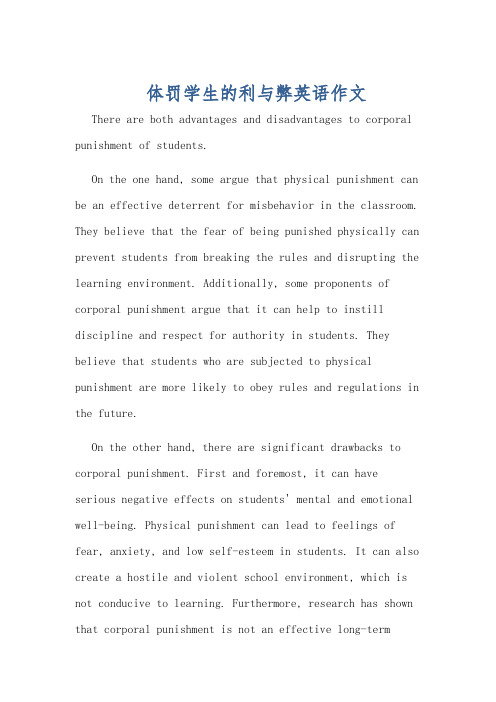
体罚学生的利与弊英语作文There are both advantages and disadvantages to corporal punishment of students.On the one hand, some argue that physical punishment can be an effective deterrent for misbehavior in the classroom. They believe that the fear of being punished physically can prevent students from breaking the rules and disrupting the learning environment. Additionally, some proponents of corporal punishment argue that it can help to instill discipline and respect for authority in students. They believe that students who are subjected to physical punishment are more likely to obey rules and regulations in the future.On the other hand, there are significant drawbacks to corporal punishment. First and foremost, it can have serious negative effects on students' mental and emotional well-being. Physical punishment can lead to feelings of fear, anxiety, and low self-esteem in students. It can also create a hostile and violent school environment, which is not conducive to learning. Furthermore, research has shown that corporal punishment is not an effective long-termsolution for addressing behavioral issues. Instead, it can perpetuate a cycle of violence and aggression.In conclusion, while some may argue that corporal punishment has its merits, the negative consequences far outweigh any potential benefits. It is important for educators and policymakers to seek alternative, non-violent disciplinary methods that prioritize the well-being and development of students.体罚学生的利与弊体罚学生的做法一直备受争议。
初中英语作文:体罚解决不了问题

初中英语作文:体罚解决不了问题
Physical Punishment Cant Work
Nowadays there are still many children abused in school. to some teachers, the only way to punish some students is to beat them. some students have even become disabled because of that. the worst' of all is that their souls have been hurt deeply, which might never be cured in their whole life. the same thing happens in many families. i want to ask those teachers and parents, can such kind of “education” have any effects?
“体罚解决不了问题”英语作文译文:
现在仍然有许多儿童在学校受到虐待。
一些老师惩罚不听话或学习不好的学生的惟一方式就是殴打他们,有的学生甚至被打成残废。
更重要的是,他们的心灵受到严重伤害。
有的伤痛可能终其一生也无法弥补。
同样的事情也在许多家庭中重演。
我想问一下这样做的老师和家长们,这种“教育”能解决问题吗?。
体罚的危害英语作文

体罚的危害英语作文英文回答:Corporal punishment is a form of discipline thatinvolves the use of physical force to inflict pain on achild as a means of punishment. It can include spanking, hitting, whipping, or any other form of physical abuse. While some parents may argue that corporal punishment is an effective way to deter misbehavior, there is overwhelming evidence to suggest that it is harmful and ineffective.Physical harm.Corporal punishment can cause serious physical injuries, including bruises, cuts, and broken bones. In some cases,it can even lead to death. Even if it does not cause severe injuries, corporal punishment can still cause pain and discomfort, which can lead to anxiety, depression, andother mental health problems.Psychological harm.In addition to physical harm, corporal punishment can also cause significant psychological harm. Children who are subjected to corporal punishment are more likely to experience low self-esteem, anxiety, and depression. They are also more likely to be aggressive and violent themselves.Ineffectiveness.Despite the claims of some parents, there is no evidence that corporal punishment is an effective way to deter misbehavior. In fact, research has shown that corporal punishment is more likely to increase aggression and violence in children.Alternatives to corporal punishment.There are many effective and non-violent alternatives to corporal punishment that can be used to deter misbehavior. These alternatives include positivereinforcement, such as praise and rewards, and time-out, which involves removing a child from a situation for a period of time.Conclusion.Corporal punishment is a harmful and ineffective practice that has no place in a civilized society. It is important to find more effective and humane ways to discipline children.中文回答:体罚的危害。
体罚的危害英语作文

体罚的危害英语作文英文回答:Corporal punishment, the infliction of physical pain as a form of discipline, has been a controversial issue for centuries. While some argue that it is an effective way to deter misbehavior, research has consistently shown that it is harmful to children's physical, mental, and emotional well-being.Physical Harm:Increased risk of injury: Physical punishment often involves hitting, slapping, or spanking, which can cause bruises, cuts, and even more serious injuries. The use of objects, such as paddles or belts, can exacerbate the severity of the harm.Reduced pain tolerance: Studies have shown that children who experience physical punishment are more likelyto develop a lower pain tolerance, which can lead to increased sensitivity and anxiety in the presence of pain.Impaired physical development: Physical punishment can interfere with the normal growth and development ofchildren's bodies. It can damage bones, muscles, and nerves, and interfere with their ability to engage in physical activities.Mental and Emotional Harm:Increased aggression: Research has found that physical punishment increases the likelihood of children becoming aggressive towards others, both in the short and long term. It teaches children that violence is an acceptable way to solve problems and resolve conflicts.Reduced self-esteem: Physical punishment can damage children's self-esteem by making them feel worthless and ashamed. It can lead to negative self-perceptions and a belief that they deserve to be treated harshly.Mental health problems: Studies have linked physical punishment to an increased risk of mental health problems, such as anxiety, depression, and post-traumatic stress disorder. These problems can persist into adulthood and negatively impact children's overall well-being.Cultural and Ethical Concerns:Cultural differences: The acceptability of physical punishment varies greatly across cultures. In some societies, it is still widely practiced, while in others it is considered a form of child abuse.Human rights: Physical punishment violates the basic human rights of children to be free from cruel and degrading treatment. It undermines the principle of non-violence and contradicts the ethics of compassion and respect for all people.Alternatives to Physical Punishment:Positive reinforcement: Rewarding children for goodbehavior rather than punishing them for misbehavior can be a more effective way to promote desired behaviors.Time-outs: Removing children from a situation for a short period of time can give them a chance to calm down and reflect on their behavior.Restitution: Requiring children to take responsibility for their actions by making amends or repairing any damage they have caused can help them learn from their mistakes.Counseling: If children are struggling with behavioral problems, seeking professional help from a therapist or counselor can help them develop coping mechanisms and strategies for managing their emotions and behavior.Corporal punishment is a harmful and ineffective practice that should be abolished. By promoting positive alternatives and protecting children's rights, we can create a society where all children are treated withdignity and respect.中文回答:体罚的危害。
父亲惩罚孩子打人英语作文

父亲惩罚孩子打人英语作文英文回答:Physical punishment is a form of discipline in which a parent or guardian uses physical force to punish a child for misbehavior. It is a controversial topic, with proponents arguing that it is an effective way to deter future misbehavior, while opponents argue that it is harmful to the child's physical and emotional well-being.There is some evidence to support the claim that physical punishment can be effective in reducing misbehavior in the short term. However, there is also evidence to suggest that it can have negative long-term consequences, such as increased aggression, anxiety, and depression. Additionally, physical punishment can damage the parent-child relationship and make it more difficult for the parent to discipline the child in a positive way.For these reasons, most experts recommend against theuse of physical punishment. There are a variety of more effective and less harmful ways to discipline children,such as positive reinforcement, time-outs, and loss of privileges.中文回答:体罚是一种管教方式,其中父母或监护人用武力来惩罚孩子的错误行为。
介绍别人的惩罚作文英语作文

介绍别人的惩罚作文英语作文英文回答:Introduction.Punishment is a form of negative consequence intendedto deter individuals from engaging in undesirable behaviors. It is a common practice in various settings, including schools, workplaces, and the criminal justice system. While punishment can serve as a deterrent, it can also have unintended negative consequences.Types of Punishment.Punishment can take various forms, including:Physical punishment: Inflicting pain or discomfort on the body, such as spanking or corporal punishment.Psychological punishment: Causing emotional distress,such as verbal abuse, humiliation, or isolation.Social punishment: Depriving individuals of social privileges or opportunities, such as grounding or ostracism.Economic punishment: Imposing financial penalties,such as fines or asset forfeiture.Effects of Punishment.Punishment can have both positive and negative effects. On the positive side, it can:Deter crime: Punishment can act as a deterrent, preventing people from committing crimes or engaging inother undesirable behaviors.Promote discipline: Punishment can help enforce rules and maintain order in various settings.Provide rehabilitation: Some forms of punishment, such as community service or anger management classes, canprovide opportunities for rehabilitation and skill development.However, punishment can also have negative consequences:Physical and psychological harm: Physical and psychological punishment can cause lasting physical and emotional damage.Increased aggression: Punishment can lead to increased aggression and antisocial behavior in the punished individual.Injustice and inequality: Punishment can be applied unfairly or disproportionately, perpetuating injustice and inequality.Alternative to Punishment.In light of the potential negative consequences of punishment, alternative approaches have been explored:Positive reinforcement: Rewarding desirable behaviorsto encourage their repetition.Natural consequences: Allowing individuals to experience the natural consequences of their actionswithout external punishment.Restorative justice: Focusing on repairing harm and fostering relationships between the offender and the victim.Conclusion.Punishment is a complex and controversial topic. Whileit can serve as a deterrent and promote discipline, it can also have unintended negative consequences. Alternative approaches, such as positive reinforcement and restorative justice, offer potential benefits without the risks associated with punishment. Understanding the effects of punishment and exploring alternatives is crucial for fostering a just and equitable society.中文回答:简介。
体罚学生 英文作文

体罚学生英文作文英文:As a student, I have experienced the issue of corporal punishment in school. I remember one time when a classmate of mine was punished by our teacher for not completing his homework. The teacher made him stand in front of the class and then proceeded to hit him on the palms of his hands with a ruler. It was a shocking and disturbing experience for me and my classmates. This incident made me realize the negative impact of corporal punishment on students.Corporal punishment not only causes physical harm but also has long-lasting psychological effects on students. It creates an environment of fear and intimidation in the classroom, making it difficult for students to focus on their studies. Instead of promoting discipline, it can lead to resentment and rebellion among students. Furthermore, it can damage the relationship between teachers and students, eroding trust and respect.In addition, corporal punishment is not an effective way to discipline students. It does not teach them how to behave appropriately or address the root causes of their misbehavior. Instead, it sends the message that violence is an acceptable means of resolving conflicts. There are more constructive and positive approaches to discipline, such as positive reinforcement, counseling, and conflict resolution strategies.中文:作为一名学生,我经历过学校中的体罚问题。
禁止体罚英语作文
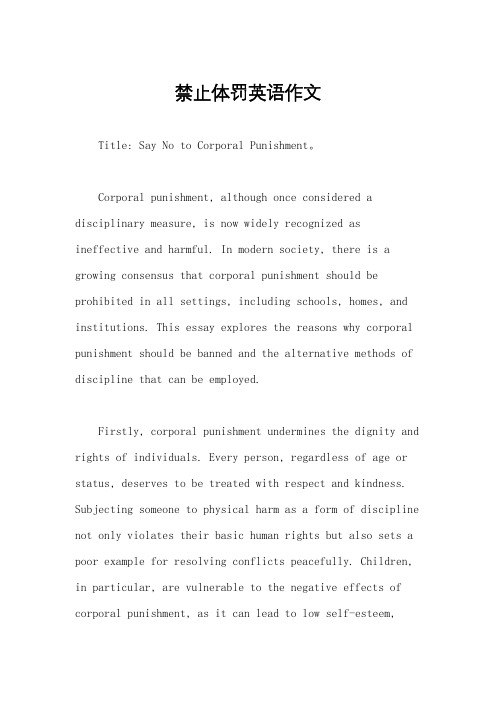
禁止体罚英语作文Title: Say No to Corporal Punishment。
Corporal punishment, although once considered a disciplinary measure, is now widely recognized as ineffective and harmful. In modern society, there is a growing consensus that corporal punishment should be prohibited in all settings, including schools, homes, and institutions. This essay explores the reasons why corporal punishment should be banned and the alternative methods of discipline that can be employed.Firstly, corporal punishment undermines the dignity and rights of individuals. Every person, regardless of age or status, deserves to be treated with respect and kindness. Subjecting someone to physical harm as a form of discipline not only violates their basic human rights but also sets a poor example for resolving conflicts peacefully. Children, in particular, are vulnerable to the negative effects of corporal punishment, as it can lead to low self-esteem,aggression, and emotional trauma.Moreover, research has consistently shown that corporal punishment is ineffective in achieving long-term behavioral change. While it may temporarily suppress undesirable behavior, it does not address the underlying causes orteach positive alternatives. Instead, it promotes fear and resentment, damaging the relationship between the disciplinarian and the individual being punished. Effective discipline should focus on teaching and guiding individuals towards responsible behavior through positive reinforcement, communication, and setting clear expectations.Furthermore, the use of corporal punishment perpetuates a cycle of violence. When children are raised in environments where physical punishment is normalized, they are more likely to resort to violence themselves inconflicts or when dealing with others. By breaking thiscycle and promoting non-violent forms of discipline, we can contribute to building a more peaceful and compassionate society.In the context of education, banning corporal punishment is essential for creating a safe and conducive learning environment. Research has shown that schools that prohibit corporal punishment have higher academic achievement, better student behavior, and improved teacher-student relationships. Alternative disciplinary methods, such as positive reinforcement, counseling, and restorative justice practices, not only address behavioral issues but also promote social and emotional development.Furthermore, banning corporal punishment in homes is crucial for protecting children from abuse. Allowing parents or caregivers to use physical force as a means of discipline opens the door to potential abuse and harm. By promoting positive parenting techniques, such as setting clear boundaries, using positive reinforcement, and employing non-violent communication strategies, we can create nurturing and supportive environments where children can thrive.In conclusion, corporal punishment should be unequivocally banned in all settings. Not only is itineffective in achieving behavioral change, but it also violates the dignity and rights of individuals, perpetuates a cycle of violence, and undermines the principles of respect and compassion. By embracing alternative methods of discipline that focus on teaching, communication, and positive reinforcement, we can create safer, healthier, and more harmonious communities for future generations to flourish.。
体罚学生利与弊英语作文
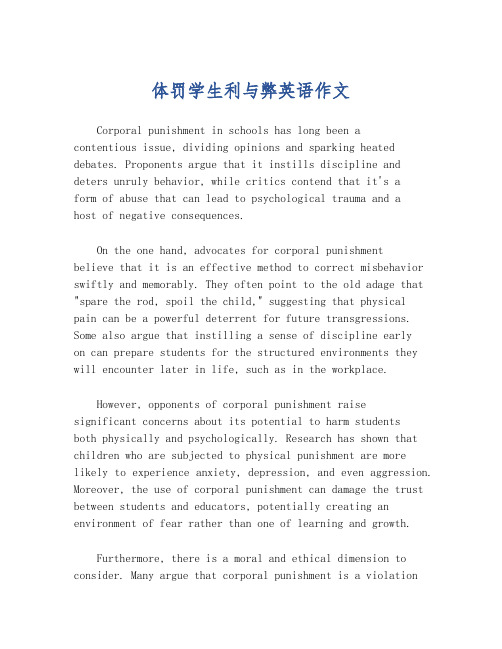
体罚学生利与弊英语作文Corporal punishment in schools has long been acontentious issue, dividing opinions and sparking heated debates. Proponents argue that it instills discipline and deters unruly behavior, while critics contend that it's aform of abuse that can lead to psychological trauma and ahost of negative consequences.On the one hand, advocates for corporal punishmentbelieve that it is an effective method to correct misbehavior swiftly and memorably. They often point to the old adage that "spare the rod, spoil the child," suggesting that physicalpain can be a powerful deterrent for future transgressions. Some also argue that instilling a sense of discipline earlyon can prepare students for the structured environments they will encounter later in life, such as in the workplace.However, opponents of corporal punishment raisesignificant concerns about its potential to harm studentsboth physically and psychologically. Research has shown that children who are subjected to physical punishment are more likely to experience anxiety, depression, and even aggression. Moreover, the use of corporal punishment can damage the trust between students and educators, potentially creating an environment of fear rather than one of learning and growth.Furthermore, there is a moral and ethical dimension to consider. Many argue that corporal punishment is a violationof a child's rights and a form of violence that is unacceptable in any educational setting. It also sets a poor example for students, teaching them that physical force is an appropriate way to resolve conflicts.In conclusion, while the debate over corporal punishment in schools continues, it is essential to weigh the potential benefits of immediate compliance against the long-term risks to a student's well-being and development. As educational practices evolve, there is a growing consensus that positive reinforcement and other non-violent disciplinary methods can be just as effective, if not more so, in maintaining order and fostering a culture of respect and learning.。
儿子小时候犯错挨打作文
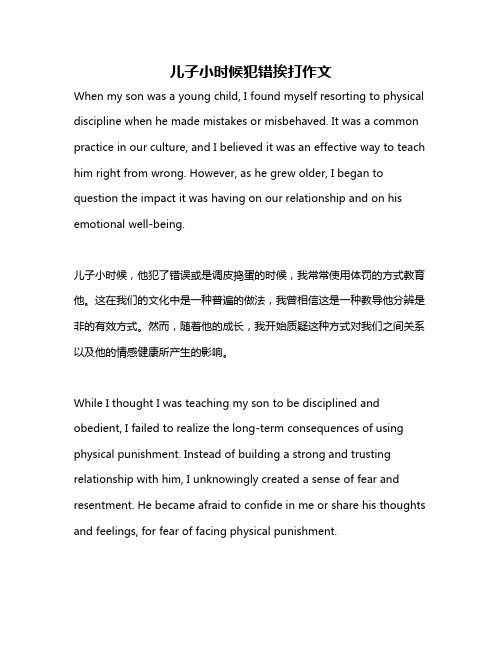
儿子小时候犯错挨打作文When my son was a young child, I found myself resorting to physical discipline when he made mistakes or misbehaved. It was a common practice in our culture, and I believed it was an effective way to teach him right from wrong. However, as he grew older, I began to question the impact it was having on our relationship and on his emotional well-being.儿子小时候,他犯了错误或是调皮捣蛋的时候,我常常使用体罚的方式教育他。
这在我们的文化中是一种普遍的做法,我曾相信这是一种教导他分辨是非的有效方式。
然而,随着他的成长,我开始质疑这种方式对我们之间关系以及他的情感健康所产生的影响。
While I thought I was teaching my son to be disciplined and obedient, I failed to realize the long-term consequences of using physical punishment. Instead of building a strong and trusting relationship with him, I unknowingly created a sense of fear and resentment. He became afraid to confide in me or share his thoughts and feelings, for fear of facing physical punishment.虽然我曾认为我是在教育儿子守纪律和孝顺,但我没有意识到使用体罚的长期后果。
揍疼了就长记性了作文
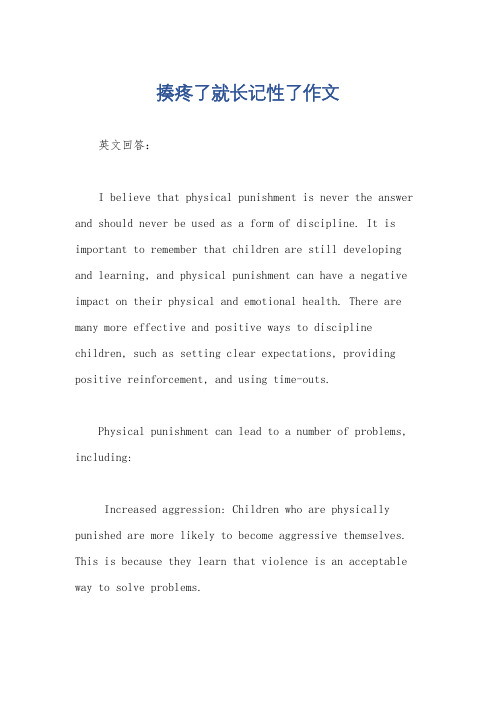
揍疼了就长记性了作文英文回答:I believe that physical punishment is never the answer and should never be used as a form of discipline. It is important to remember that children are still developing and learning, and physical punishment can have a negative impact on their physical and emotional health. There are many more effective and positive ways to discipline children, such as setting clear expectations, providing positive reinforcement, and using time-outs.Physical punishment can lead to a number of problems, including:Increased aggression: Children who are physically punished are more likely to become aggressive themselves. This is because they learn that violence is an acceptable way to solve problems.Decreased self-esteem: Physical punishment can damage a child's self-esteem. This is because it sends the message that they are not good enough and that they deserve to be punished.Mental health problems: Physical punishment can lead to a number of mental health problems, such as anxiety, depression, and PTSD. This is because it can create a sense of fear and insecurity in children.Physical injuries: Physical punishment can cause physical injuries, such as bruises, cuts, and broken bones. In some cases, it can even be fatal.There are many more effective and positive ways to discipline children. These include:Setting clear expectations: Children need to know what is expected of them. Parents should set clear rules and boundaries, and they should be consistent with their discipline.Providing positive reinforcement: Children should be rewarded for good behavior. This can include praise, hugs,or small treats.Using time-outs: Time-outs can be an effective way to discipline children. This involves sending them to a quiet place for a short period of time.It is important to remember that discipline should be used to teach children right from wrong, not to punish them. Parents should always use discipline in a way that is fair, consistent, and respectful.中文回答:我坚信体罚永远不是解决问题的办法,也不应该被用作一种纪律形式。
体罚室惩罚学生作文英语
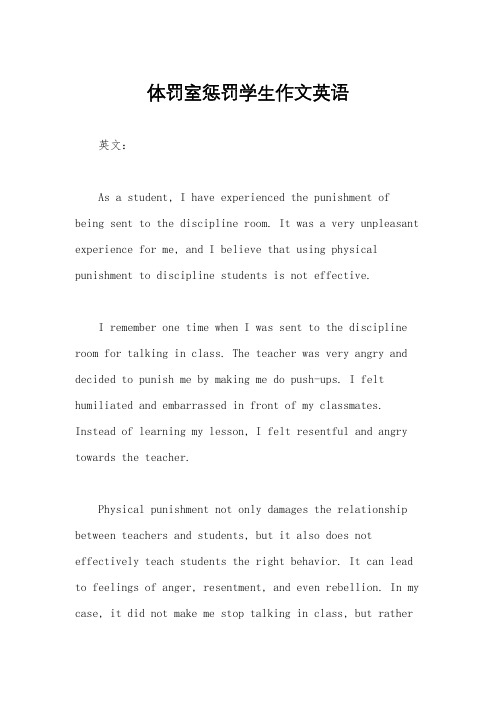
体罚室惩罚学生作文英语英文:As a student, I have experienced the punishment of being sent to the discipline room. It was a very unpleasant experience for me, and I believe that using physical punishment to discipline students is not effective.I remember one time when I was sent to the discipline room for talking in class. The teacher was very angry and decided to punish me by making me do push-ups. I felt humiliated and embarrassed in front of my classmates. Instead of learning my lesson, I felt resentful and angry towards the teacher.Physical punishment not only damages the relationship between teachers and students, but it also does not effectively teach students the right behavior. It can lead to feelings of anger, resentment, and even rebellion. In my case, it did not make me stop talking in class, but rathermade me dislike the teacher and the school environment.I believe that there are more effective ways to discipline students, such as positive reinforcement, counseling, and open communication. These methods not only teach students the right behavior, but also help to build a positive and supportive relationship between teachers and students.中文:作为一名学生,我经历过被送到体罚室受罚的经历。
女孩子被藤条打手心作文

女孩子被藤条打手心作文英文回答,The girl was beaten on her palm with a cane.中文回答,女孩子被用藤条打在手心上。
English answer: The incident took place when the girl was caught cheating in the classroom. The teacher, in an attempt to discipline her, decided to use a cane to hit her palm as a form of punishment. The girl's hand was struck multiple times, causing her immense pain and leaving red marks on her palm.中文回答,这个事件发生在女孩在教室里作弊被发现的时候。
老师为了惩罚她,决定用藤条打她的手心。
女孩的手被打了多次,造成了剧痛,并在手心上留下了红印。
English answer: The girl's classmates witnessed the incident and were shocked by the teacher's actions. Some of them felt sorry for the girl and tried to console her afterwards. They were appalled by the teacher's use ofphysical punishment and felt that it was unnecessary and excessive.中文回答,女孩的同学们目睹了这一事件,对老师的行为感到震惊。
其中一些同学为女孩感到难过,并在事后试图安慰她。
英语写作关于教育惩戒的作文
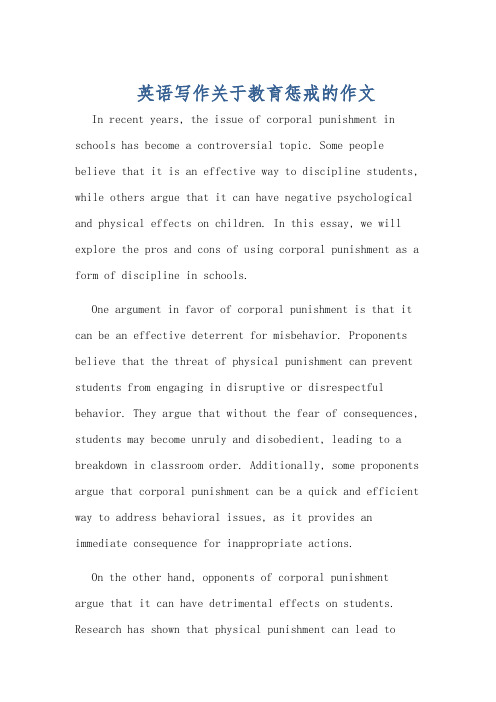
英语写作关于教育惩戒的作文In recent years, the issue of corporal punishment in schools has become a controversial topic. Some people believe that it is an effective way to discipline students, while others argue that it can have negative psychological and physical effects on children. In this essay, we will explore the pros and cons of using corporal punishment as a form of discipline in schools.One argument in favor of corporal punishment is that it can be an effective deterrent for misbehavior. Proponents believe that the threat of physical punishment can prevent students from engaging in disruptive or disrespectful behavior. They argue that without the fear of consequences, students may become unruly and disobedient, leading to a breakdown in classroom order. Additionally, some proponents argue that corporal punishment can be a quick and efficient way to address behavioral issues, as it provides an immediate consequence for inappropriate actions.On the other hand, opponents of corporal punishment argue that it can have detrimental effects on students. Research has shown that physical punishment can lead toincreased aggression, lower self-esteem, and a negative attitude towards school. In addition, there is evidence to suggest that students who are subjected to corporal punishment may develop mental health issues, such as anxiety and depression. Furthermore, opponents argue that corporal punishment can lead to an unsafe and hostile school environment, as it normalizes the use of violence as a means of resolving conflicts.In my opinion, corporal punishment should not be used as a form of discipline in schools. While it may provide a short-term solution to behavioral issues, the long-term consequences can be harmful to students. Instead, schools should focus on implementing positive behavior management strategies, such as positive reinforcement and conflict resolution skills. By creating a positive and supportive school environment, students are more likely to developself-discipline and respect for authority.Furthermore, teachers and school staff should receive training on effective discipline techniques that do not involve physical punishment. This can include learning how to de-escalate conflicts, communicate effectively withstudents, and establish clear and consistent rules and consequences. By equipping educators with the necessaryskills and resources, schools can create a safe andnurturing environment for all students.In conclusion, the use of corporal punishment as a formof discipline in schools is a contentious issue. While some argue that it can be an effective deterrent for misbehavior, the negative effects on students outweigh any potential benefits. Instead, schools should focus on implementing positive behavior management strategies and providing teachers with the necessary training and support to createa safe and supportive learning environment.最近几年,学校中的体罚问题成为了一个有争议的话题。
弹钢琴不好被打的作文
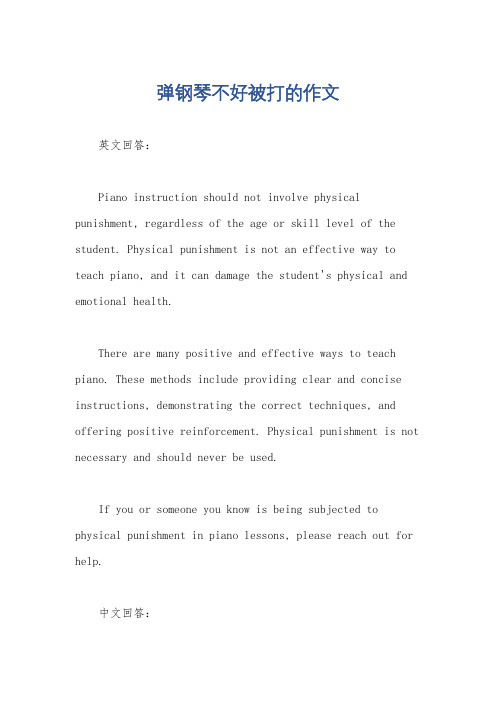
弹钢琴不好被打的作文英文回答:Piano instruction should not involve physical punishment, regardless of the age or skill level of the student. Physical punishment is not an effective way to teach piano, and it can damage the student's physical and emotional health.There are many positive and effective ways to teach piano. These methods include providing clear and concise instructions, demonstrating the correct techniques, and offering positive reinforcement. Physical punishment is not necessary and should never be used.If you or someone you know is being subjected to physical punishment in piano lessons, please reach out for help.中文回答:弹钢琴不应受到体罚,无论学生的年龄或技能水平如何。
体罚不是教授钢琴的有效方法,而且会损害学生的生理和心理健康。
有许多积极而有效的方法可以教授钢琴。
这些方法包括提供清晰简洁的说明、展示正确的技术和提供积极的强化。
体罚是没有必要的,也不应该使用。
如果你或你认识的人在钢琴课上受到体罚,请联系寻求帮助。
对学校体罚的看法英语作文
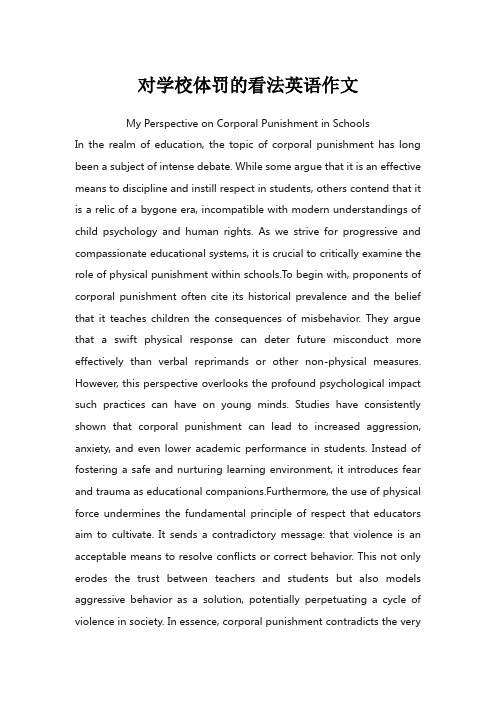
对学校体罚的看法英语作文My Perspective on Corporal Punishment in SchoolsIn the realm of education, the topic of corporal punishment has long been a subject of intense debate. While some argue that it is an effective means to discipline and instill respect in students, others contend that it is a relic of a bygone era, incompatible with modern understandings of child psychology and human rights. As we strive for progressive and compassionate educational systems, it is crucial to critically examine the role of physical punishment within schools.To begin with, proponents of corporal punishment often cite its historical prevalence and the belief that it teaches children the consequences of misbehavior. They argue that a swift physical response can deter future misconduct more effectively than verbal reprimands or other non-physical measures. However, this perspective overlooks the profound psychological impact such practices can have on young minds. Studies have consistently shown that corporal punishment can lead to increased aggression, anxiety, and even lower academic performance in students. Instead of fostering a safe and nurturing learning environment, it introduces fear and trauma as educational companions.Furthermore, the use of physical force undermines the fundamental principle of respect that educators aim to cultivate. It sends a contradictory message: that violence is an acceptable means to resolve conflicts or correct behavior. This not only erodes the trust between teachers and students but also models aggressive behavior as a solution, potentially perpetuating a cycle of violence in society. In essence, corporal punishment contradicts the veryvalues of empathy, understanding, and positive reinforcement that form the cornerstone of effective pedagogy. By focusing on positive reinforcement, educators can motivate students towards good behavior without resorting to fear or pain. Programs like restorative justice, which prioritize repairing harm and restoring relationships over punishment, have demonstrated success in fostering a sense of community and personal responsibility among students.In conclusion, while corporal punishment may have been seen as a traditional method of discipline, contemporary research and evolving societal norms call for its abandonment. The promotion of non-violent, empathetic, and educational approaches to discipline is imperative for the healthy development of our youth and the cultivation of a more just and compassionate society. It is time for schools to embrace methodologies that reflect our enhanced understanding of child development and the value of respect for every individual's dignity. In doing so, we can create learning environments that truly nurture growth, understanding, and the holistic well-being of all students.。
惩戒英文作文初中
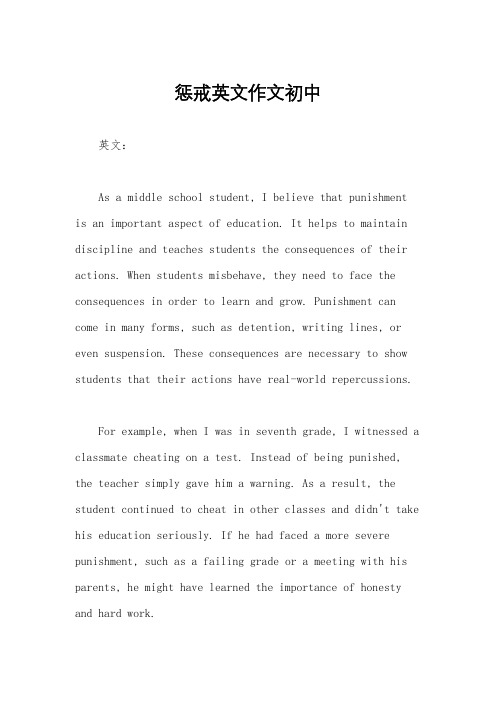
惩戒英文作文初中英文:As a middle school student, I believe that punishmentis an important aspect of education. It helps to maintain discipline and teaches students the consequences of their actions. When students misbehave, they need to face the consequences in order to learn and grow. Punishment can come in many forms, such as detention, writing lines, or even suspension. These consequences are necessary to show students that their actions have real-world repercussions.For example, when I was in seventh grade, I witnessed a classmate cheating on a test. Instead of being punished, the teacher simply gave him a warning. As a result, the student continued to cheat in other classes and didn't take his education seriously. If he had faced a more severe punishment, such as a failing grade or a meeting with his parents, he might have learned the importance of honesty and hard work.Punishment also helps to create a safe and respectful learning environment for all students. When students know that there are consequences for their actions, they areless likely to disrupt the class or behave inappropriately. This allows teachers to focus on teaching and students to focus on learning, creating a more positive and productive atmosphere in the classroom.In conclusion, punishment is an essential part of education. It teaches students about responsibility and accountability, and helps to create a safe and respectful learning environment. Without punishment, students may not learn the valuable lessons that come from facing the consequences of their actions.中文:作为一名初中生,我相信惩罚是教育的重要组成部分。
棍棒英语作文
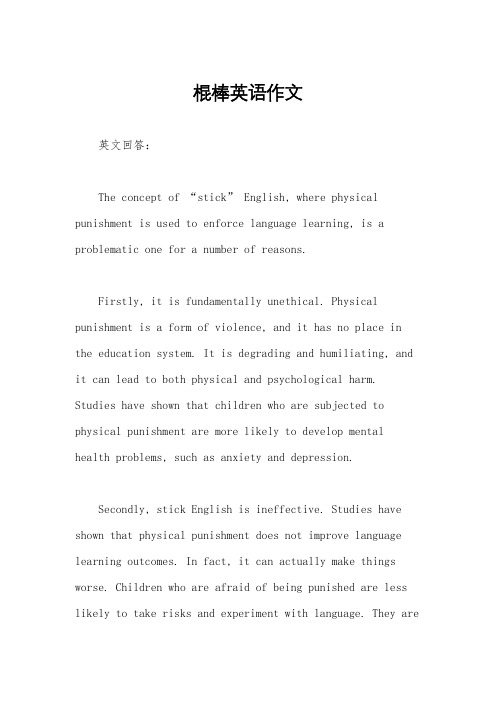
棍棒英语作文英文回答:The concept of “stick” English, where physical punishment is used to enforce language learning, is a problematic one for a number of reasons.Firstly, it is fundamentally unethical. Physical punishment is a form of violence, and it has no place in the education system. It is degrading and humiliating, and it can lead to both physical and psychological harm. Studies have shown that children who are subjected to physical punishment are more likely to develop mental health problems, such as anxiety and depression.Secondly, stick English is ineffective. Studies have shown that physical punishment does not improve language learning outcomes. In fact, it can actually make things worse. Children who are afraid of being punished are less likely to take risks and experiment with language. They arealso more likely to develop negative attitudes towards learning.Thirdly, stick English is unnecessary. There are many effective ways to teach English without resorting to physical punishment. These methods include positive reinforcement, such as praise and rewards, and more engaging and interactive teaching methods.In conclusion, stick English is an unethical, ineffective, and unnecessary practice. It has no place in the modern education system.中文回答:棍棒英语,一种过时的且有害的教学方法。
被老师体罚作文
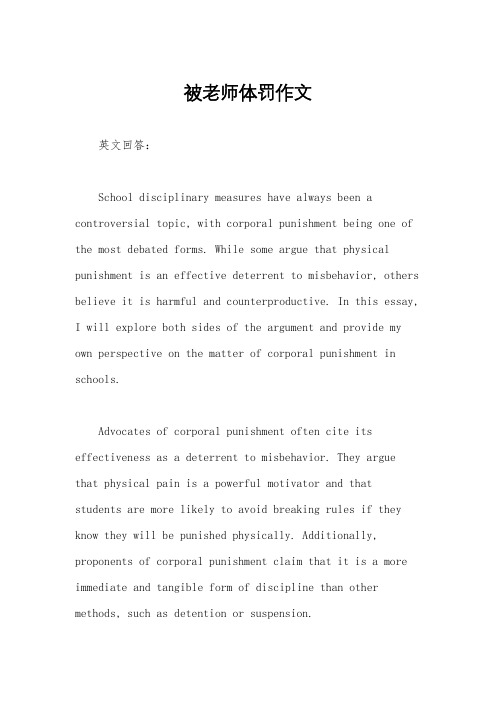
被老师体罚作文英文回答:School disciplinary measures have always been a controversial topic, with corporal punishment being one of the most debated forms. While some argue that physical punishment is an effective deterrent to misbehavior, others believe it is harmful and counterproductive. In this essay, I will explore both sides of the argument and provide my own perspective on the matter of corporal punishment in schools.Advocates of corporal punishment often cite its effectiveness as a deterrent to misbehavior. They arguethat physical pain is a powerful motivator and that students are more likely to avoid breaking rules if they know they will be punished physically. Additionally, proponents of corporal punishment claim that it is a more immediate and tangible form of discipline than other methods, such as detention or suspension.However, there is also a growing body of research that suggests that corporal punishment is harmful and counterproductive. Studies have shown that physical punishment can lead to a number of negative outcomes, including increased aggression, decreased empathy, and impaired cognitive development. Additionally, corporal punishment can damage the relationship between teachers and students, and it can create a climate of fear and intimidation in the classroom.In my opinion, the evidence against corporal punishment is overwhelming. There is no place for physical violence in schools, and it should be abolished as a disciplinary measure. There are numerous other effective forms of discipline that can be used to deter misbehavior, such as detention, suspension, and counseling. These methods are more humane and effective than corporal punishment, and they do not have the same negative side effects.中文回答:学校体罚。
